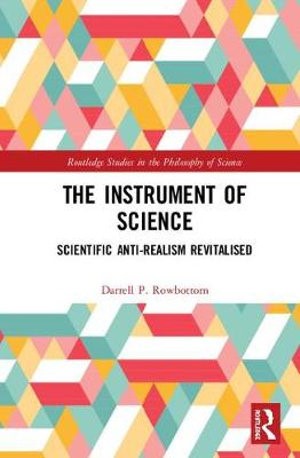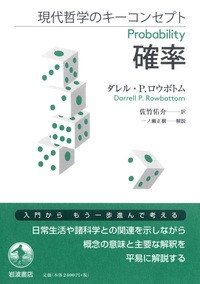Prof. Darrell Rowbottom
Professor
Editor-in-Chief, Studies in History and Philosophy of Science Part A
Associate Editor, Australian Journal of Philosophy
Coordinating Editor, Theory and Decision
Background
Prior to my appointment at Lingnan, I was a British Academy Postdoctoral Fellow at the Faculty of Philosophy, University of Oxford. I have also worked at several other universities in the UK, including Aberdeen, Bristol, Durham, and Edinburgh.
I started out studying physics, but undertook graduate studies in philosophy and history and philosophy of science. The shift of direction is easily explained: I was fascinated by quantum theory, and what my lecturers (wrongly!) thought that it tells us about the world.
Research
Overview
I am interested in a wide variety of topics in philosophy of science, epistemology, metaphysics, and philosophy of probability. I also publish in other areas, including philosophy of education and philosophy of mind, from time to time.
The core connected questions that drive my research are 'How should we inquire about the world?' and ‘What can we know about the world?’
Recent Monologue
My reecent monograph, The Instrument of Science: Scientific Anti-Realism Revitalised, articulates and defends a new form of instrumentalism about science. This position—‘cognitive instrumentalism’—involves three core theses. First, science makes theoretical progress primarily when it furnishes us with more predictive power or understanding concerning observable things. Second, scientific discourse concerning unobservable things should only be taken literally in so far as it involves observable properties or analogies with observable things. Third, scientific claims about unobservable things are probably neither approximately true nor liable to change in such a way as to increase in truthlikeness.
There are examples from science throughout the book, and I show at length therein how cognitive instrumentalism fits with the development of late nineteenth- and early twentieth-century chemistry and physics, and especially atomic theory. I also argues that there is a kind of understanding, empirical understanding, which we can achieve without having true, or even approximately true, representations of unobservable things.
My work on this was supported by a Humanities and Social Sciences Prestigious Fellowship from Hong Kong's Research Grant Council (RGC), and a COFUND Senior International Research Fellowship held at Durham University's Institute of Advanced Study.

‘This accessible and engaging defence of instrumentalism is essential reading for all those interested in the debate between realism and instrumentalism in the philosophy of science.’
Jon Williamson, University of Kent at Canterbury
‘Analyzing fascinating examples from the history of science, this book builds a compelling and carefully argued case for cognitive instrumentalism: that is, for a philosophy of science that takes seriously what we can understand, and do, with science in the world as we experience it.’
Axel Gelfert, Technical University of Berlin
‘[A] welcome and timely addition to the literature. It will certainly help the anti-realist cause, as it provides a number of serious challenges to realism.’
Review in NDPR, by K. Brad Wray, Aarhus University
Teaching
Recent Textbook
My textbook on the philosophy of probability, imaginatively called ‘Probability’, was published by Polity Press in 2015. It’s intended to be the most accessible introduction to the subject of how we should interpret, or understand, probabilities. It discusses real world applications, e.g. in fallacies and reasoning, quantum mechanics, genetics, and game theory.
It was recently published in Japanese by Iwanami Shoten Press. And it will also appear shortly in simplified Chinese with Shanghai People's Publishing House.

It was recently published in Japanese by Iwanami Shoten Press.

It will also appear shortly in simplified Chinese with Shanghai People's Publishing House.
‘This is a remarkable book in that, while using the absolute minimum of mathematics, it manages to explain all the main views in the philosophy of probability clearly and accurately. Indeed it covers some recent approaches on which active research is taking place at the moment.’
Donald Gillies, University College London
‘Easy and fun to read, this book is a thought-provoking introduction to a wide range of important theories and issues about the nature of probability.’
Timothy Williamson, University of Oxford
‘[A] wonderful introductory book on the philosophical issues surrounding the notion of probability.’
Review in Polish Journal of Philosophy, by Leszek Wroński, Jagiellonian University
‘Its optimal audience will include anyone interested in what probabilities are regardless of prior background in mathematics. The book is written in a playful style, consisting of enthusiastic prose, frequent examples, and many short dialogs that are mainly used to illustrate difficulties for each of the views considered. These features make the book well suited for readers who are new to philosophy or who have never studied interpretations of probability, including students just starting their university degree. The book is particularly well suited for individuals who are interested in learning about the metaphysics of probability on their own. Instructors who are interested in teaching a course on interpretations of probability would also do well to assign this book as a clear guide to the central positions and motivations of the debate, using it as a foundation to explore more detailed discussions or primary work on the subjects it covers ... There really is not a comparable text on interpretations of probability at this level of accessibility.’
Review in Metascience, by Justin Dallmann, University of Toronto
Supervision
I presently supervise four PhD students, each of whom holds a Hong Kong PhD Fellowship. These are:
Haktan Akcin, Alexander Ehmann, Micheál Lacey, and David Villena Saldaña.
My first PhD student (as chief supervisor) was Christopher Atkinson, who now teaches at Lingnan and Hong Kong University. Congratulations to Chris for his recent paper on the aim of belief in Synthese.
I also currently supervise two MPhil students, namely:
Chi Yin Chan and Ka Yan Mok.
Congratulations to Chi Yin for her recent paper on self-deception in Philosophical Psychology (which you'll find a preprint of below).
Other Forthcoming & New Publications (2015-)
‘Bertrand’s Paradox and the Maximum Entropy Principle’ (with Nicholas Shackel), Philosophy and Phenomenological Research (In Press)
An important suggestion of objective Bayesians is that the maximum entropy principle can replace a principle which is known to get into paradoxical difficulties: the principle of indifference. No one has previously determined whether the maximum entropy principle is better able to solve Bertrand’s chord paradox than the principle of indifference. In this paper I show that it is not. Additionally, the course of the analysis brings to light a new paradox, a revenge paradox of the chords, that is unique to the maximum entropy principle.
Download Online Journal Version
‘A Methodological Argument Against Scientific Realism’, Synthese (In Press)
First, I identify a methodological thesis associated with scientific realism. This has different variants, but each concerns the reliability of scientific methods in connection with acquiring, or approaching, truth or approximate truth. Second, I show how this thesis bears on what scientists should do when considering new theories that significantly contradict older theories. Third, I explore how vulnerable scientific realism is to a reductio ad absurdum as a result. Finally, I consider which variants of the methodological thesis are the most defensible in light of the earlier findings.
Download Online Journal Version (Free Access)
‘Self-Deception and Shifting Degrees of Belief’ (with Chi Yin Chan), Philosophical Psychology (In Press)
A major problem posed by cases of self-deception concerns the inconsistent behavior of the self-deceived subject (SDS). How can this be accounted for, in terms of propositional attitudes and other mental states? In this paper, we argue that key problems with two recent putative solutions, due to Mele and Archer, are avoided by ‘the shifting view’ that has been advanced elsewhere in order to explain cases where professed beliefs conflict with actions. We show that self-deceived agents may possess highly unstable degrees of belief concerning the matters about which they are self-deceived.
‘Scientific Realism: What It Is, The Contemporary Debate, and New Directions’, Synthese 196, 451–484 (2019)
First, I answer the controversial question ‘What is scientific realism?’ with extensive reference to the varied accounts of the position in the literature. Second, I provide an overview of the key developments in the debate concerning scientific realism over the past decade. Third, I provide a summary of the other contributions to this special issue.
Download Online Journal Version
‘Karl Popper’, in D. Pritchard (ed.), Oxford Bibliographies Online (2019)
This is my bibliography entry on Karl Popper, which covers the full range of his work and the secondary literature theron. Sections include: key primary sources; introductory works and collections; multiauthor general anthologies; critical rationalism; philosophy of science (incl. many subsections); social and political philosophy; probability; ancient philosophy; education; and biographical interest.
‘Beyond Kuhn: Methodological Contextualism and Partial Paradigms’, in M. Mizrahi (ed.), The Kuhnian Image of Science: Time for a Decisive Transformation?, 191–208. (Lanham: Rowman & Littlefield)
In this chapter, I provide an account of how science may undergo rational piecemeal change without any 'revolution', or dramatic shift from normal to extraordinary science, taking place. I argue that partial paradigms (qua disciplinary matrices), or groups thereof, may be used as to direct exploration.
‘Probability Theory’, in S. O. Hansson and V. F. Hendricks (eds), Introduction to Formal Philosophy (Dordrecht: Springer) (2018)
This chapter covers the epistemic or information-based interpretations of probability: logical, subjective, objective Bayesian, and group level. It explains how these differ from aleatory of world-based interpretations of probability, presents each in detail, and then discusses its strengths and weaknesses.
‘Instrumentalism’, in J. Saatsi (ed.), The Routledge Handbook of Scientific Realism (London: Routledge) (2017)
This chapter does three main things. First, it provides a characterisation of instrumentalism with reference to nineteenth-century thinkers involved in its genesis. Second, it identifies and addresses several common misconceptions concerning instrumentalism. Third, it covers several key objections to instrumentalism, which hinge on the significance of observability. Overall, the chapter argues that instrumentalism is a live position when it is properly construed.
‘Indoctrination and Science Education’, in M. A. Peters et al. (eds), Encyclopaedia of Educational Philosophy and Theory (Springer) (2016)
Can students be trained to be excellent scientists purely, or failing that mainly, by means of indoctrination? And if not, what role, if any, should indoctrination play in science education? These are the main questions discussed in this entry. They are epistemic and pragmatic, rather than moral, in character.
‘What Is (Dis)Agreement?’, Philosophy and Phenomenological Research 97, 223–236 (2018).
When do we agree? The answer might once have seemed simple and obvious; we agree that p when we each believe that p. But from a formal epistemological perspective, where degrees of belief are more fundamental than beliefs, this answer is unsatisfactory. On the one hand, there is reason to suppose that it is false; degrees of belief about p might differ when beliefs simpliciter on p do not. On the other hand, even if it is true, it is too vague; for what it is to believe simpliciter ought to be explained in terms of degrees of belief. This paper presents several possible notions of agreement, and corresponding notions of disagreement. It indicates how the findings are fruitful for the epistemology of disagreement, with special reference to the notion of epistemic peerhood.
Download Online Journal Version
‘How Might Degrees of Belief Shift? On Actions Conflicting With Professed Beliefs’, Philosophical Psychology 29, 732–742 (2016)
People often act in ways that appear incompatible with their sincere assertions (such as trembling in fear when their death becomes an imminent possibility, despite earlier professing that “Death is not bad!”). But how might we explain such cases? On the shifting view, subjects’ degrees of belief (or degrees of confidence) may be highly sensitive to changes in context. This paper articulates and refines this view, after defending it against recent criticisms. It details two mechanisms by which degrees of beliefs may shift.
Download Online Journal Version
‘Extending the Argument from Unconceived Alternatives: Observations, Models, Predictions, Explanations, Methods, Instruments, and Values’, Synthese (In Press)
Stanford’s argument against scientific realism focuses on theories, just as many earlier arguments from inconceivability have. However, there are possible arguments against scientific realism involving unconceived (or inconceivable) entities of different types: observations, models, predictions, explanations, methods, instruments, experiments, and values. This paper charts such arguments. In combination, they present the strongest challenge yet to scientific realism.
Download Online Journal Version
‘On Component Forces in Physics: A Pragmatic View’, in H-K. Chao, J. Reiss and S-T. Chen (eds), Philosophy of Science in Practice: Nancy Cartwright and the Nature of Scientific Reasoning, 111–126 (New York: Springer) (2017)
Do component forces exist? I argue that the answer lies in the affirmative, on historical and operational grounds.
‘Scientific Progress Without Increasing Verisimilitude: In Response to Niiniluoto’, Studies in History and Philosophy of Science 51, 100–104 (2015)
First, I argue that scientific progress is possible in the absence of increasing verisimilitude in science’s theories. Second, I argue that increasing theoretical verisimilitude is not the central, or primary, dimension of scientific progress. Third, I defend my previous argument that unjustified changes in scientific belief may be progressive. Fourth, I illustrate how false beliefs can promote scientific progress in ways that cannot be explicated by appeal to verisimilitude.
Download Online Journal Version
Other Forthcoming & New Publications (2010-2014)
Several encyclopedia entries and book chapters (as well as book reviews) are not included in this list, but you're welcome to contact me if you'd like electronic copies of these or of the published versions of any of the articles below.
For access to some of my older publications, check my Philpapers page, my Academia.edu page, my Researchgate page, and my Google Scholar page.
A complete list of my publications is on my CV.
‘Information Versus Knowledge in Confirmation Theory’, Logique et Analyse 226, 137–149 (2014)
‘Intuitions in Science: Thought Experiments as Argument Pumps’, in A. R. Booth and
D. P. Rowbottom (eds), Intuitions (Oxford: Oxford University Press), 119–134 (2014)‘Kuhn vs. Popper on Criticism and Dogmatism in Science, Part II: How to Strike the Balance’,
Studies in History and Philosophy of Science 44(2), 161–168 (2013)‘Empirical Evidence Claims Are A Priori’, Synthese 190(14), 2821–2834 (2013)
‘Identification in Games: Changing Places’, Erkenntnis 77, 197–206 (2012)
‘The Instrumentalist’s New Clothes’, Philosophy of Science 78, 1200–1211 (2011)
Popper's Critical Rationalism: A Philosophical Investigation (London: Routledge, 2011)
‘Kuhn vs. Popper on Criticism and Dogmatism in Science: A Resolution at the Group Level’,
Studies in History and Philosophy of Science 42(1), 117–124 (2011)
‘Approximations, Idealizations and “Experiments” at the Physics-Biology
Interface’, Studies in History and Philosophy of Biological and Biomedical Sciences 42(2), 145–154 (2011)‘Stances and Paradigms: A Reflection’, Synthese 178(1), 111–119 (2011)
‘What’s at the Bottom of Scientific Realism?’ (Essay Review of H. Sankey,
Scientific Realism and the Rationality of Science), Studies in History and Philosophy of Science 42(4), 625–628 (2011)‘The Use and Misuse of Taxpayers’ Money: Publicly-Funded Educational
Research’ (with Sarah Aiston), British Educational Research Journal 37(4), 631–655 (2011)‘What Scientific Progress Is Not: Against Bird’s Epistemic View’,
International Studies in the Philosophy of Science 24(3), 241–255 (2010)‘Corroboration and Auxiliary Hypotheses: Duhem’s Thesis Revisited’, Synthese 177(1), 139–149 (2010)

